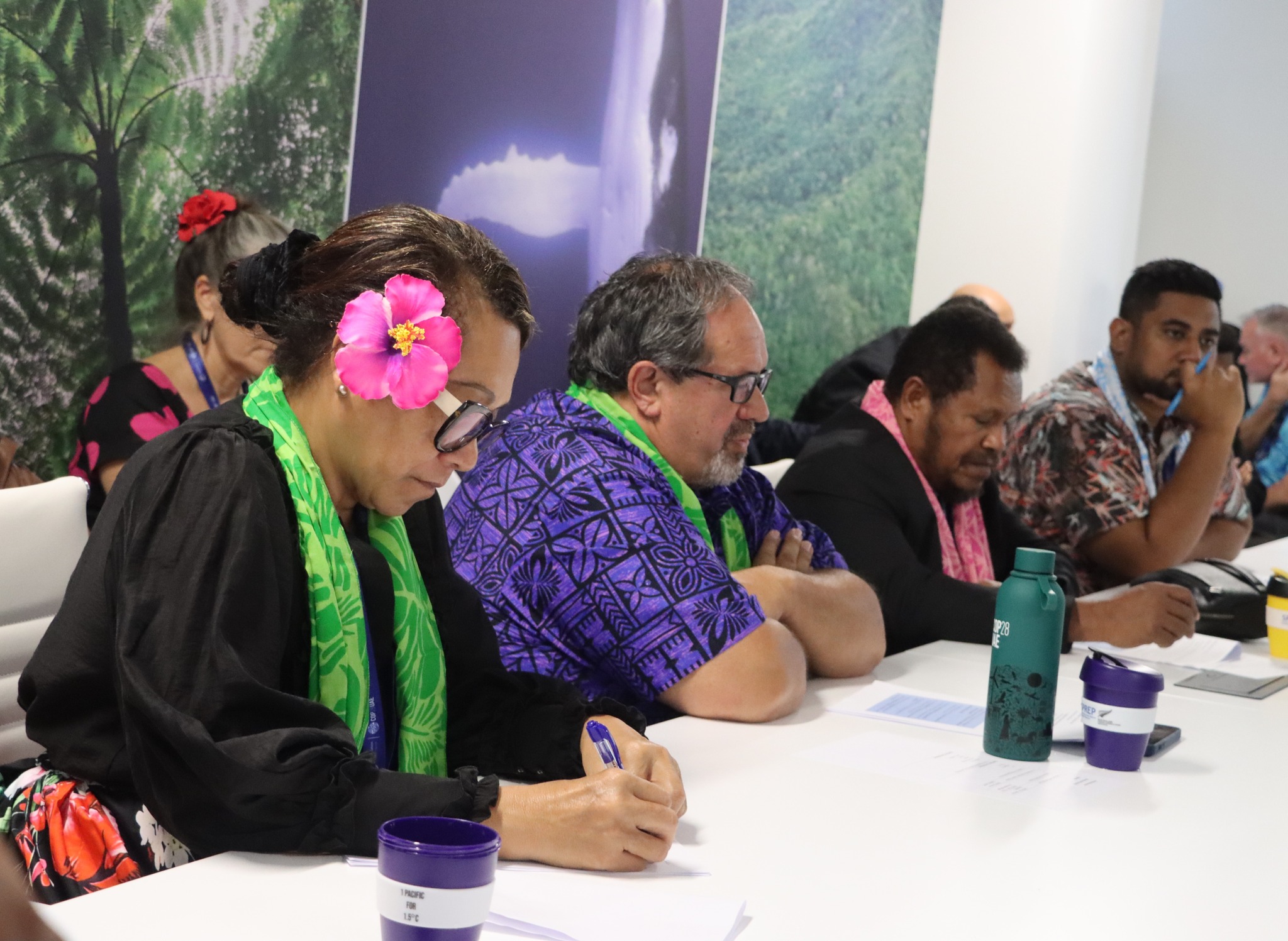Funding uncertainty as climate change impacts Pacific
Monday 11 December 2023 | Written by Losirene Lacanivalu | Published in Economy, Local, National, Weather

Wayne King at the Pacific Small Island Developing States (PSIDS) Ministerial briefing at the Pacific Delegation Office at COP28 on Monday last week. SPREP / 23120605
‘The Cook Islands is highly vulnerable and at risk to extreme events’
With the Cook Islands being highly vulnerable and at risk of extreme events and climate change, the loss and damage fund will be used specifically for the losses incurred from these events.
However, whether countries can access the fund centrally, like the Green Climate Fund, or regionally such as through the Pacific Resilience Facility is still uncertain, says Director of Climate Change Cook Islands, Wayne King.
At the United Nations Climate Change Conference (COP28) meeting in Dubai, the loss and damage fund was agreed at the opening plenary of the first day of the summit.
This is said to be a win for developing countries who hoped this would indicate commitment by the developed, polluting nations to assist financially with the ongoing effects of climate change.
The loss and damage fund was highlighted by the Cook Islands delegation to COP28, to seek an agreement on the issue.
King said, while the fund had been agreed, and funds to the tune of US$770 million pledged, the next critical step is to nominate a board where Small Island Developing States (SIDS) have two seats, and one seat for Pacific Small Island Developing States (PSIDS).
“The board will work to operationalise the actual policies as well as accessing the fund, and whether countries can access the fund centrally, like the Green Climate Fund, or regionally such as through the Pacific Resilience Facility is still uncertain.”
King said Cook Islands is highly
vulnerable and at risk to extreme events and climate changes.
“This fund is specific to the losses and damages occurring as a result of these events including long term events such as sea-level rise.”
Meanwhile, he said at the COP28 event, there is quite a range of areas where Cook Islands can access both technical and financial resources, some of which the country already has access to.
King added the Cook Islands delegation are following areas of discussion that includes
climate finance, mitigation or reducing emissions from large emitting countries, global stocktake - monitoring whether the world has taken enough action based upon scientific advice from the Intergovernmental Panel on Climate Change (IPCC), and transparency- how a country reports on its obligations under the Paris Agreement .
King was also part of a high level side event at the COP28 discussions on strengthening national coordination mechanisms for effective climate finance delivery in the Pacific Small Island Developing States (PSIDS).
“Our situation in the Pacific and Caribbean region is quite specific, our needs are specific.”
King also shared on the SPREP social media page on why SIDS and LDCs (leastdeveloped countries) should retain Special Circumstances Status.
“The reason we really want to ensure that special circumstances of LDCs, SIDS and Africa is maintained throughout all the agreement that we reach here on the Paris Agreement, because it is enshrined, it has always been there, it was agreed, it was negotiated at the time right back at the start of the convention of climate change.
“It has come through the Kyoto Protocol
but so much because that applies to the developed countries, but certainly
within the context of the Paris Agreement.”
He said they want to maintain that sentiment throughout the conference.
King said there is a lot of pressure to have special circumstances for South America and for African countries.
“Which means for every one of them, so there is a sort of fundamental problem with that because we are all vulnerable including the developed world as well, but what we are trying to say is our situation in the Pacific and Caribbean region is actually quite specific, our needs are specific.
“Small economies, distance, we have these attributes no one else has, that is the reason we want to maintain that issue as just us, not everybody else.”














































